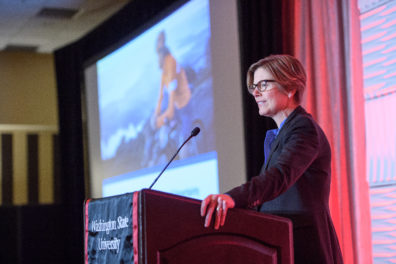
Bold Moves in Health Care Discussed at 2017 Power Breakfast
What do health care companies and universities have in common? Much more than doctors, according to 2017 Power Breakfast Keynote Speaker Susan Mullaney.
Mullaney is president of Kaiser Permanente Washington, a nonprofit health plan and the eighth and newest region of Kaiser Permanente, one of America’s leading health care providers and not-for-profit health plans. Given the national challenges facing the health care industry, the Carson College tapped Mullaney to share her leadership and professional insights on this timely topic.

During her address, “Bold Moves in a Time of Uncertainty,” Mullaney said universities and health care organizations have quite a lot in common, from changing times, big challenges, and big opportunities, to how to deal with all of it from business and leadership perspectives.
She congratulated WSU for opening the medical school in Spokane. “This falls in the category of being bold and audacious,” Mullaney said. “It’s not just a medical school—it’s a medical school with a mission to recruit a diverse student body and train physicians to serve underserved communities. That’s a big issue in this country.”
Similarly, Kaiser Permanente is also opening a medical school in Pasadena, California, in the fall of 2019, but with a twist: physicians will be trained not only in medicine and leadership, but also the health of populations and public health policy.
“WSU and Kaiser Permanente are both proud organizations, and who we are matters now more than ever,” she said.
In a time of contention surrounding U.S. health care policy, she said Kaiser Permanente remains focused on the principles that rank the company number one in the health care industry for customer service and in the top five percent nationally for quality.
“When you think about all that’s happening nationally with health care—for us it’s easy, because it doesn’t change who we are or what we do,” said Mullaney.
The past informing the future

Kaiser Permanente was established 70 years ago by Henry J. Kaiser, an industrialist with an altruistic spirit. Kaiser’s shipyard workers mass produced ships during WWII, including liberty ships used for carrying general cargo, munitions, and critical supplies to troops. Part of his brilliance was figuring out how to pare down the liberty ship’s 45-day production time to just four days, a feat that helped win WWII, Mullaney said.
Because Kaiser needed to keep his workers healthy, he partnered with Sidney Garfield, a young physician, who came up with concept of prepaid health care: for a nickel a day, Kaiser’s workers received health care for themselves and their families.
Leading differently is inherent in Kaiser Permanente history, Mullaney said. Kaiser was one of the first to embrace diversity and inclusion by hiring women of color to work in the shipyards. Together, he and Garfield worked to desegregate hospitals. “Henry Kaiser believed in his people. All of the business leaders in this room are part of his success story,” she said.
Model of affordable health care

Kaiser Permanente’s model is successful because its physicians lead clinical and quality care decisions within the organization, Mullaney said. There is one electronic medical database where patients’ health history and other medical information is stored to help doctors provide cutting edge treatment. Doctors only order necessary tests for patients, which helps to streamline care, reduce medical errors, manage costs, and improve outcomes. Breast cancer patients, for example, have a significantly higher chance of survival and spend half the amount of time receiving chemo and radiation therapy than someone in a nonintegrated system, Mullaney explained.
The company regularly surveys its physicians and staff to measure the culture of the organization. Kaiser Permanente also takes three percent of its top line of revenue and invests it back into the community by providing care to those who can’t afford it; supporting schools, parks, and recreation areas; and offering internship and job opportunities.
“We evolve with the times and with our customers to meet their needs, whether they are business owners who need health insurance for their employees, a member, or a patient,” Mullaney said.
Impacts for Washington state
Kaiser Permanente Washington provides affordable health care to more than 677,000 members across the state. The organization was established in February 2017 following Kaiser Permanente’s acquisition of Group Health and its subsidiaries. Mullaney led the integration planning for the acquisition and has oversight of $1 billion. Kaiser Permanente is investing in the region during the next 10 years as it continues to work toward making high-quality affordable health care available to all.
“One of the biggest issues in the country currently is how to make health care affordable and not compromise quality,” Mullaney said, “and there are lots of ways to solve this beyond the Affordable Care Act.”

While the act provides 20 million people with coverage, 30 million are still uninsured. In Washington state alone, 50 percent of babies are born into Medicaid roles.
Mullaney said Kaiser Permanente is moving into the digital space with programs that will allow people to use their own technology devices to manage their health care. The company has earmarked $400 million to renovate its Capitol Hill campus in Seattle and establish new clinics across the state, and is doing more to address the needs of Washington small business owners.
“The real reform that needs to happen is financially incentivizing the health care system and restructuring how health care is delivered,” she said.
To push to the next level, Kaiser Permanente is focusing on what people will need in the next five years and designing specialty care products and services to meet those needs.
The Power Breakfast speaker series continues to inform, inspire, and engage Seattle‑area business leaders on contemporary business issues.